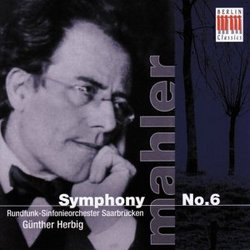| All Artists: Gustav Mahler, Gunther Herbig, Saarbrucken Radio Symphony Orchestra, Sinfonie Orchester des Saarlandischer Rundfunk Title: Mahler: Symphony No. 6 Members Wishing: 0 Total Copies: 0 Label: Berlin Classics Original Release Date: 1/1/2007 Re-Release Date: 5/8/2007 Genre: Classical Style: Symphonies Number of Discs: 1 SwapaCD Credits: 1 UPC: 782124946128 |
Search - Gustav Mahler, Gunther Herbig, Saarbrucken Radio Symphony Orchestra :: Mahler: Symphony No. 6
 | Gustav Mahler, Gunther Herbig, Saarbrucken Radio Symphony Orchestra Mahler: Symphony No. 6 Genre: Classical |
Larger Image |
CD Details |
CD ReviewsPerfect balance L. Johan Modée | Earth | 05/11/2007 (5 out of 5 stars) "On this record we hear Günther Herbig conducting a live performance of Mahler's sixth, with Saarbrücken Radio Symphony Orchestra playing. A less well-known orchestra and not quite so famous conductor. But this recording deserves to be heard. Some drawbacks first, however: Herbig omits the first movement exposition repeat, but with the excuse that the recording is taken from a concert. There are also a few audible coughs from the audience. Half-cons: Andante is placed second, as on Rattle's recording (EMI). But this is perhaps not a drawback. Since the whole performance is placed on one disc this can easily be adjusted by programming the CD player. Some pros: the orchestra plays as good as possibly they can, not on routine. Herbig adopts a detached view of the work, not over-emphasizing any part or section. The hammerblows (just two, as usual) in the finale are, for example, quite loud but not too loud as in Zander's recording with Philharmonia (Telarc). The interpretation is somewhat similar to Bernstein's (SONY) and Szell's (SONY), but is far better recorded than these. That is: it has an forceful drive but it is not extravagantly "personal", as is the case with, for example, Rattle's (EMI). Nothing is overarticulated, but in perfect balance. Hence this is a very "symphonic" Mahler sixth, in which the classical structure of the work gets a clear, well performed, and powerful presentation. Very well recorded and at midprice, it is a bargain. Warmly recommended! " Classical tragedy, well realised P. Weber | Los Angeles | 07/03/2007 (5 out of 5 stars) "This is a swift, urgent M6 with plenty of contrasts which may not be to all tastes. If you prefer the slow, drawn-out performances (Barbirolli) you may find this a jolt. But I feel this music comes across more effectively when played in a classical style instead of romantic. Even though this is a live concert the playing and sound quality are very good. I consider this CD a sleeper in the M6 discography. The beginning march tempo moves along urgently, but Herbig provides the necessary tempo adjustments and makes it sound convincing. I find it very exciting and passionate and the Alma music is nicely done as well as the ghostly sections. The scherzo (placed second) is also well articulated in the main tempo and it conjures up a devil's dance, but then Herbig relaxes with the slower sections referred to as the old fashioned music. The andante flows beautifully and Herbig is wise enough not to drag it out as some conductors do, turning it into mush. The last movement has all the spookiness and intensity you could want and the hammer blows are well done (loud but not over done - some people really go crazy over these hammer blows). This is a taut, classic, coherent performance by a conductor who knows his stuff in Mahler. All of Mahler's sound affects can be heard without spotlighting anything. If you like a fairly straight forward performance with quickish tempos, this one's for you. I certainly prefer this to Abaddo's boring Berlin recording." A new discovery Ryan Richards | Midland, MI United States | 01/27/2008 (5 out of 5 stars) "This is a truly great Mahler 6, one of the best recordings I've heard (and I've heard at least ten). The Saarbrucken Radio Symphony isn't an ensemble on par with the world's great Mahler orchestras (Berlin, Vienna, New York, etc.), and this is a live recording to boot, so there are some flubs and moments of insecure ensemble. But the tradeoff is hearing this music played with the freshness and zeal of a new discovery, as opposed to the staid interpretations that are possible from orchestras that have played this symphony hundreds of times. Most importantly, conductor Gunther Herbig has the ability to reconcile two seemingly opposite interpretive approaches: playing up dramatic moments while never losing sight of the long line of phrases and the forward momentum of the music. The result is a taut yet flexible first movement and scherzo (here played as the second movement), an andante that manages to sing while never losing its flow or getting bogged down in sentimentality, and an impulsive finale with great orchestral buildup to the climaxes and a truly catastrophic coda (you won't hear more violent timpani work anywhere else). Applause is included but comes far enough after the final note that you can skip it if you choose, and the audience is extremely well behaved throughout. Overall, this and George Szell's Cleveland Mahler 6 are the two best live Mahler Sixths I've heard, and this recording is certainly one of my favorites among all contenders, live or not. But it proved difficult for me to get here in the U.S., so snap it up if it's available."
|
